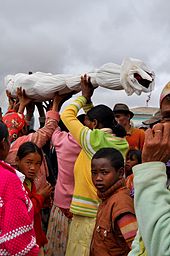
Branden Kartchner
Prior to the 18th century, Madagascar was ruled by a series of kings. In the early nineteenth century, Britain provided military training and financial assistance to the kingdom in return for a Malagasy pledge to abolish the slave trade. With the establishment of this diplomatic relationship, The London Missionary Society arrived and established schools, translated the Bible, and introduced innovative technology to the natives. The foreign influence caused the subsequent ruler, Queen Ranavalona, to outlaw Christianity in order to preserve traditional faith and thwart colonialism. After her death, the absolute monarchy was abolished and the office of prime minister was created. The new government not only allowed Christianity, but in 1869 also deemed it the official religion of the court.
While British interest in the strategic value of Madagascar diminished, the island continued to interest the French. France invaded the island in 1895, and the following year it was declared a French Colony. The French labored to quell anti- European sentiments, including anti-Christian feelings. In 1958, Madagascar gained independence from France. Various regimes followed the granted independence and they rotated between military, socialist, and democratic governments. Currently, the government is a democracy with a president, prime minister, and bicameral parliament. However, political instability has continued to plague the state.
Madagascar is home to an interesting and distinct religious culture. According to a recent survey, 52% of the population adheres to traditional beliefs, 41% are Christians, and the remaining 7% of Malagasies are Muslim. Traditional beliefs include a belief in a Supreme God. Malagasies esteem ancestral links as sacred. Natives believe in close ties between the living and dead. The dead are viewed as intermediaries between God and mankind and can affect the fortunes of the family—for good or evil. Families hold family burial grounds as sacred and the Malagasy will hold special festive ceremonies to unearth ancestral remains and wash them to honor them before reburial. If the dead are offended or neglected, Malagasies believe that great hardship or trouble can result. The burial tombs of the family are built with great cost and care and are oftentimes more expensive than the family home.
Sources: Encyclopedia Africana 2005; Historical Dictionary of Madagascar 2005; Country Studies—Area Handbook program of the U.S. Department of the Army